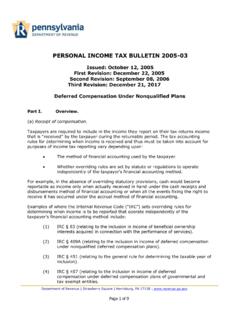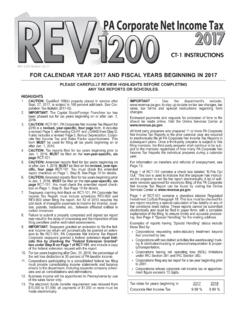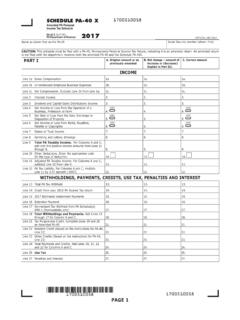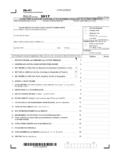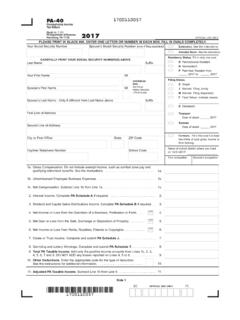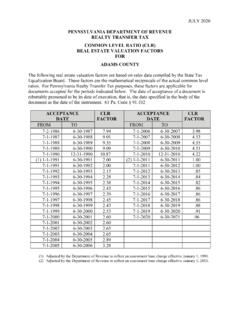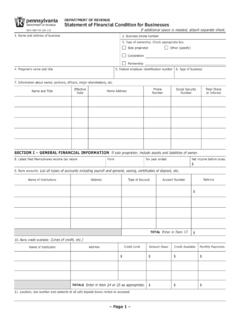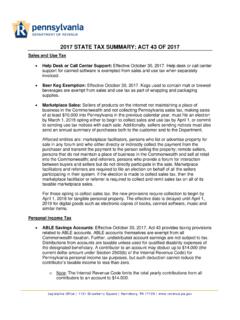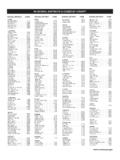Transcription of Brochure: Sale of Your Principal Residence and PA Personal ...
1 SALE OF YOURPRINCIPAL RESIDENCEAND PA Personal INCOMETAX IMPLICATIONSG enerally, homeowners who owned and usedtheir homes as Principal residences for at leasttwo of the five years prior to the date of sale willqualify for exclusion of the gain from the sale ofa Personal Residence from PA taxable is a Residence ?A Residence is a house, lodging or other place ofhabitation, including a trailer or condominium that: Has independent or self-contained cooking,sleeping and sanitation facilities; Was used and physically occupied by a taxpayerfor residential purposes; and Was not occupied or used by a taxpayer on a sporadic and transient basis, or only for a definiteand promptly accomplished are the requirements to exclude fromPA-taxable income the gain from the sale of aprincipal Residence ?The seller(s) must meet these four requirements:(1) Date of Sale: The sale of the Principal Residence must be after Dec.
2 31, 1997. The date ofthe sale is the date the buyer accepts the deed andthe title passes from the seller to the buyer, usuallythe date of the seller postpones delivery of the deed, the saleis the date possession and the burdens and benefitsof ownership pass from the seller to the buyer. For a condemnation, the date of the sale is the datethe taxpayer receives the condemnation destruction or casualty loss, the date of sale isthe date the taxpayer receives the casualty insurance proceeds or damages.(2) Use:The law requires that a taxpayer used theresidence as the Principal Residence for a total of at least two years during the five-year period preceding the date of :John bought a house in Harrisburg onJan. 1, 2001. He lived there until July 1, 2002. Hechanged jobs and moved to Pittsburgh in July 2002,but he maintained his Harrisburg home. He did notrent it or use it for any other purposes.
3 He movedback to his home in Harrisburg in 2003 and livedthere until he sold it in 2005. John meets therequirement for using his house as his Principal Residence for at least two years during the five-yearperiod preceding the John had never moved back to his Harrisburghome, he would not meet the use requirement forthis exclusion. Even though he never rented hishouse or used it for any other purpose, John wouldhave to pay PA income tax on any gain he realizedfrom the sale of his Harrisburg home.(3) Ownership:The law requires that a taxpayerowned the Residence as a Principal Residence for atotal of at least two years during the five-year period preceding the date of :Mary leased one-half of a house in StateCollege and resided there since 2000. In 2002, shebought the entire property and used it as her Principal Residence until she sold it in 2005.
4 Marymeets the ownership requirement for this , if Mary had bought the house in 2004, shewould not meet the ownership requirement. Important: The taxpayer does not have to meet the use and ownership requirements simultaneously, but the taxpayer must meet both during the five-year period preceding the dateof the sale.(4) Prior Sale: To qualify for the exclusion, thetaxpayer could not have sold another Principal Residence within the two years preceding the date ofsale of the current :Rob and Ann owned and lived in a housein Johnstown. In February 2002, they moved to Erieand bought a new house. In August 2002, they soldtheir Johnstown home. They owned and used theErie home as their Principal Residence until they soldOnline Customer Service Service & Information CenterPersonal Taxes: 717-787-8201 Business Taxes: 717-787-1064e-Business Center: 717-783-6277 Automated 24-hour FACT & Information Line1-888-PATAXES (728-2937)Touch-tone service is required for this toll-free to order forms or check the status of a Personal income tax account, corporation taxaccount or property tax/rent rebate.
5 Automated Forms Ordering Message Service1-800-362-2050 Service for Taxpayers with Special Hearing and/or Speaking Needs1-800-447-3020 Call or visit your local Department of Revenue district office, listed in the government pages of local telephone INFORMATIONREV-625 PO (04-15)Even if the taxpayer s family physically occupied the Residence , it is not the taxpayer s Principal Residence if he or she did not occupy :Bill and Helen purchased a home inPittsburgh in January 2001, and Bill began workingin Philadelphia in March 2001. He leased an apartment there and commuted to Pittsburgh onweekends, holidays and vacations. In January 2005,they sold their Pittsburgh Residence . Helen meetsthe use and ownership requirement for the exclusion, but Bill does not. He meets the ownershiprequirement, but does not meet the use require-ment. He only used his Pittsburgh home for threemonths in 2001.
6 His Principal Residence was hisapartment in Philadelphia. If they elect to file separate PA tax returns, Helen qualifies for theexclusion on her half of the gain, while Bill must payPA Personal income tax on his half of the gain. If they file jointly, since one spouse met the fourrequirements, they both qualify for the if one of the homeowners die?The authorized representative of a decedent maynot claim this exclusion on the final PA tax return of an otherwise qualifying decedent, unless the decedent closed the sale before death. The decedent s estate or trust may not exclude the gainon the sale of the decedent s Principal if the taxpayer sells the Principal Residence on an installment basis?If the owner meets all four requirements, an installment sale qualifies for this if a Principal Residence is a mixed-useproperty (partly used for business, commercial,industrial, rental, investment or other non-it in June 2005.)
7 They meet all the requirements forthis , if Rob and Ann sold their Johnstown homein August 2003, they would not meet the prior salerequirement for the Erie house s exclusion. Theyowned and used their house for at least two yearsduring the five-year period preceding the sale, butthey would have sold their Principal Residence within two years of the sale of their next if a taxpayer meets the use and ownership requirements, but sells his or herprincipal Residence within two years of sellinghis or her next Principal Residence ?The taxpayer will not qualify for the , if the Principal Residence is sold due to anunforeseen change in employment, health or severefinancial hardship, a taxpayer could qualify for the exclusion. An unforeseen change is one causedby accident, illness, loss of property, casualty or another unexpected event beyond the control of the :If in the previous example Rob and Annsold their Principal Residence in Erie because Ann semployer relocated her to Williamsport, they wouldqualify for the exclusion from the two-year priorsale provision based on an unexpected change a taxpayer owns more than one home,which is the Principal Residence ?
8 The Principal Residence is the home that the taxpayer physically occupied and personally usedmost during the five years preceding the sale of the Residence . Moving furniture and personalbelongings into a Residence does not qualify as could one spouse qualify and the other not?If a couple files a joint return and at least onespouse qualifies for the exclusion, they will bothqualify. However, if they file separate returns, then they each must qualify for the exclusion :If one spouse lived in an assisted-livingfacility for the four years immediately preceding thesale of the Residence and the other spouse lived inthe Residence , the spouse that lived in the assisted-living facility does not qualify and must pay tax onhis or her share of the gain. The best way to avoidthis situation is to file a joint PA income tax the requirements for the exclusion aren tmet, how is gain reported?
9 Gain or loss is reported on PA Schedule department supplies a worksheet that assists in calculating a gain on the sale of a Principal Residence and the taxable portion. The PA-19 worksheet and instructions are available on thedepartment s website, , or bycalling a taxpayer sells a house and qualifies for a full exclusion of the gain, is he required to report any information on/with the PA-40tax return?If a taxpayer is eligible for Tax Forgiveness withoutreporting any gain from the sale of a principle Residence , he is required to include the gain fromthe sale of the home on Line 8 in Part C of PASchedule SP, Special Tax Forgiveness, in the determination of eligibility income . Otherwise, taxpayers qualifying for the full exclusion of the gainare not required to report or include any additionalinformation or forms with PA-40 income tax purposes) Could the taxpayer stillqualify for the exclusion?
10 The taxpayer may be able to exclude a portion ofthe gain. Gain is determined separately on the portion of the property used for residential purposes and the portion of the property used forother purposes. The gain that is attributable to theproperty used for nonresidential purposes does notqualify for the is a mixed-use property?Examples of mixed-use property include the following: A sole proprietor s Residence above his retail store; A duplex where the owner rents one unit andlives in the other; and An office or licensed daycare facility located within a use also includes property where the landsurrounding the Residence is more than the taxpayer reasonably needs for a Residence . The landsurrounding a farmhouse that the taxpayer uses forcommercial agriculture, livestock breeding or dairypurposes is not necessary for residential if some time during the period a taxpayerowned a home, a portion of the Residence wasused as a business in the home?
